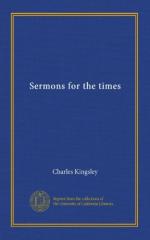are true, and must be true, and are worth all other
words in the world put together—that God
is our Father, and we his sons. Oh, my friends,
believe earnestly this blessed news! the news of Christmas-day,
that you are not God’s slaves, but his sons,
heirs of God, and joint-heirs with Christ;—joint-heirs
with Christ! In what? Who can tell?
But what an inheritance of glory and bliss that must
be, which the Lord Jesus Christ Himself is to inherit
with us—an inheritance such as eye hath
not seen, and incorruptible, undefiled, and that fadeth
not away, preserved in heaven for us; an inheritance
of all that is wise, loving, noble, holy, peaceful—all
that can make us happy, all that can make us like God
Himself. Oh, what can we expect, if we neglect
so great salvation? What can we expect, if when
the Great God of heaven and earth tells us that we
are His children, we turn away and fall down, become
like the brutes, and the savages, or worse, like the
evil spirits who rebel against God, instead of growing
up to become the sons of God, perfect even as our
Father in heaven is perfect? May He keep us all
from that great sin! May He awaken each and every
one of you to know the glory and honour which Jesus
Christ brought for you when He was born at Bethlehem—the
glory and honour which was proclaimed to belong to
you when you were christened at that font! May
He awaken you to know that you are the sons of God,
and to look up to Him with loving, trustful, obedient
souls, saying from your hearts, morning and night
‘Our Father which art in heaven,’ and feeling
that those words give you daily strength to conquer
your sins, and feel assurance of hope that your Heavenly
Father will help and prosper you, His family, every
time you struggle to obey His commandments, and follow
the example of His perfect and spotless Son, Jesus
Christ the Lord!
SERMON XVII. DEATH IN LIFE
Romans viii. 12, 13. Brethren, we are debtors,
not to the flesh, to live after the flesh. For
if ye live after the flesh, ye shall die: but
if ye through the Spirit do mortify the deeds of the
body, ye shall live.
Does it seem strange to you that St. Paul should warn
you, that you are not debtors to your own flesh?
It is not strange, when you come to understand him;
certainly not unnecessary: for as in his time,
so now, most people do live as if they were debtors
to their own flesh, as if their great duty, their
one duty in life, was to please their own bodies,
and brains, and tempers, and fancies, and feelings.
Poor people have not much time to indulge their brains;
and no time at all, happily for them, to indulge their
fancies and feelings, as rich people do when they
grow idle, and dainty, and luxurious. But still,
too many of them live as if they were debtors to their
own flesh; as if their own bodies and their own tempers
were the masters of them, and ought to be their masters.




